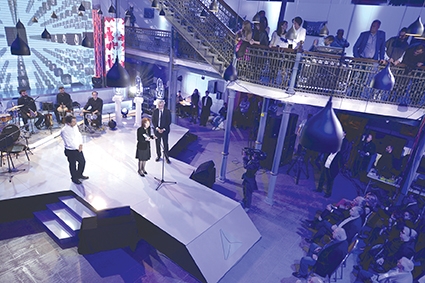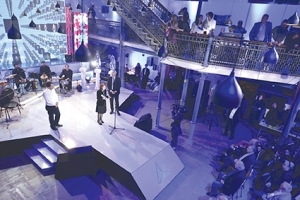Saba Annual Literature Competition Winners Announced
The winners of the 15th annual literature competition Saba were announced during an award ceremony held at the Tbilisi History Museum Karvasla this Saturday.
The Saba Literary Competition was founded in 2003 by TBC Bank and the Georgian Pen-Center, with the aim of assessing and identifying the literary processes carried out throughout the past year and naming the best literary works and their authors.
Any original literary work published in the form of novel, prose, poetry, or a play, Georgian translation of foreign literary work, documental prose, and literary criticism are considered for the award, alongside the best literary debut, best foreign translation into Georgian, best foreign translation of Georgian literature into a foreign language, best electronic book, and an award for outstanding contribution to literature.
Together with special prizes, winners are awarded with a monetary prize. The overall annual award fund is GEL 52,000.
The competition jury usually consists of five members, changed each year. The jury has no chair person and its members are writers whose works are not being considered for the competition in that award year. The voting is done through a closed voting system.
In the 15 years of the existence of the Saba literary competition, 2,700 books have been submitted and 127 awards given to 102 writers, poets and translators, while 60 writers have already sat in the jury.
This year, 300 works were submitted, and 47 selected as finalists.
“If something united the Georgian identity through all these centuries, it was primarily the language, and the literature. Saba always attempts to concentrate on both,” Rati Amaglobeli, Georgian poet and the host of the 2017 Saba awards said in his opening speech.
Diana Anpimiadi, member of the jury, gave the award for Best Literature Criticism to Nana Trapaidze for her work ‘Literature and Literature’.
“It’s a hugely important contest and an important category nomination, and I would like to thank the editor of this book, and especially the cover designer, Natalia Avaliani. I often say that the eleventh text of this book for me is its cover,” Trapaidze said as she accepted the award.
The next category announced was the Best Essay and Documentary Prose for 2016, with the award going to Levan Berdzenishvili’s ‘Evolution of Literacy,’ which, according to its author, tells the “unknown stories of various authors, their relations to each other, the topic of ‘banned books’” and much more. In the introduction, he writes of his hope that, after reading this particular book, readers will get interested in reading other books, too.
“I think that if anything interesting has been created in Georgia in Post-Soviet times and even before, something deep, and original, it is literature,” Lasha Bughadze, Georgian writer, member of the jury, said as he announced the winner of the award for Documental Prose.
“I decided I had to write a book which would then interest younger generations to read more; apparently it was read by the kind of people who read day and night anyway!” Berdzenishvili joked while receiving his award.
The Best Literary Debut of the year went to authors: Beka Akhalaia ‘For those leaves that did their duty’ (collection of poems) chosen by the jury, and Zurab Abashidze for ‘How to Kill Billy Eliot’, (Books in Batumi Publishing) which was the people’s choice through internet voting.
The next nomination was for Best Electronic Book of 2016, with the award going to two authors: Andro Buachidze, for his poetic collection ‘Spring comes at night’ and Luka Bakanidze’s collection of stories ‘Where are you, Lazare…?’
Khatuna Tskhadadze was then announced as the winner for the Best Foreign Literature Translation into Georgian for Umberto Eco’s ‘Foucault’s Pendulum’.
“Translation is an enormous, totally different responsibility, especially when, as a translator you’re working with authors who are so much better than you yourself are,” she said.
The award for the Best Georgian Language Book into a Foreign Language went to Sybilla Heinze for Anna Kordzaia-Samadashvili’s ‘Who Killed Chaika’ translated into German.
Lasha Tabukashvili received a Saba award for the Best Play in 2016, for ‘Somewhere over the rainbow’.
“There are no losers today, nor are there at any Saba literature competition,” Tabukashvili said. “It’s the first time I’ve received this award. The Saba Literature Competition is not just a contest; it has transformed into a major literature event. We writers are often alone while working, and we need to connect with one another and meet each other more often to analyse and understand just how deep the Georgian literature process is”.
The Best Prose Collection award went to Rusudan Rukhadze for her collection of prose ‘One of you will betray me’.
Famous Georgian writer and poet Vakhtang Javakhadze was then awarded the Best Poetry Collection of 2016 for his ‘Elegy and other…’ and the evening came to a culmination when the winner of the Best Novel of the Year was revealed, the award going to Aleko Shugladze’s ‘Hiding’.
“I would like to thank the characters of my book as it’s they who created it, not me. I would like to thank my readers; I would like to thank my publishing house Diogene, my friends living here in Georgia and abroad, and TBC Bank and Saba,” Shugladze said after accepting the award.
Well-known poet Lia Sturua was awarded for Outstanding Contribution to Literature by Mamuka Khazaradze, Founder of TBC Bank.
“I would like to thank all of you who through all these years are creating literary works and actively collaborating with Saba,” Khazaradze said.
“When we founded Saba, it was to have the function of being supportive to the literary process and for 15 years Saba has continued to do so,” he noted. “We need, you; we need your talent and intellectual thought, especially today when our country is facing so many challenges”.
“As Paul Verlaine said, music, nuances, shades and colors are most important in poetry,” Sturua said. “Literature should be considered as important as the economy, politics and social issues”.
Nino Gugunishvili











